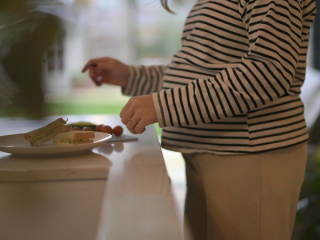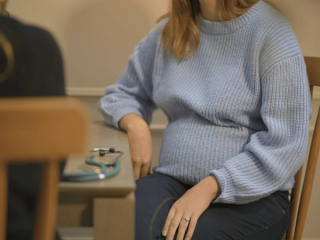
- Home
- Advice Hub
- Pregnancy
- Pregnancy Diet
- Healthy Eating During Third Trimester
Foods to Eat During The Third Trimester
Learn tips for healthy eating during your third trimester. Explore essential nutrients, meal ideas, and snacks to support you and your baby's well-being.
Why is it important to eat healthy during the third trimester?
It’s always important to eat healthily, but during pregnancy your diet not only needs to provide enough energy and nutrients for your own needs, but also for your growing baby. This is increasingly important as your baby grows.
On the flip side, eating can become more difficult in the third trimester as your baby takes up even more space, squishing your digestive system. Heartburn and indigestion are more commonly noticed around now, and you can feel full more quickly. You can help ease these symptoms by:
- Eating smaller meals, so you don’t feel too full afterwards
- Avoiding too many spicy foods
- Trying not to eat dinner too close to bedtime. (If you’re still hungry before you go to sleep, have a small snack)
- Continue to eat a healthy balanced diet
How many calories should you be eating in your third trimester?
The standard daily calorie intake for an adult female is around 2000 kcal, however energy requirements increase slightly during the later stages of pregnancy, usually during the third trimester.
There’s no perfect equation to predicting the growing energy needs, as it is largely dependent on pre-pregnancy weight and activity levels etc, but general guidance from the UK NHS is to consume an extra 200 calories, bringing the recommended daily calorie intake for the third trimester to 2200 kcal. Not exactly ‘eating for two’!
For reference, an extra 200 kcal is about the same as:
- 2 slices of wholegrain bread with vegetable oil spread
- 2 medium sized bananas
- 1 large egg with a slice of wholegrain bread to dip (Only British Lion stamped eggs are safe to eat with a runny yolk when pregnant)
- 2 x 125g pots of low fat yoghurt
For those in Ireland, advice from the HSE is slightly different. Recommendations are that on average there is a need for an additional 260 to 340 calories during the second trimester, and an additional 450 to 500 calories during the third trimester.
The most important thing is that you’re eating the right foods to keep you and your baby healthy and following the advice from your healthcare professional.
What foods should you be incorporating into your diet in your third trimester?
In the third trimester, you should continue to eat a healthy, balanced diet. That means eating the full range of food groups and following the advice of the Government’s Eatwell guide , and The Food Pyramid in Ireland. You’re also recommended to avoid the foods mentioned in our article here.
In addition, pay particular attention to the following nutrients throughout your third trimester:
Continue to avoid too much Vitamin A throughout the remainder of your pregnancy, including supplements containing vitamin A, liver (including pate) and liver products like fish liver oil.
This is because although Vitamin A is important for good health and for the healthy development of your baby, large amounts can harm your unborn baby.
Calcium and vitamin D are needed for normal growth and development of bone.
Dairy foods, such as milk, cheese and yogurt are a good source of calcium: try and opt for low fat varieties where possible. Other non-dairy sources include fortified plant-based milks and yogurts, calcium-fortified breakfast cereals, green leafy vegetables, almonds, Brazil nuts, hazelnuts and sesame seeds.
You can get small amounts of vitamin D from eggs, oily fish, milk and yoghurt, but we get most of our vitamin D from the summer sun. As the British weather doesn’t always deliver, pregnant and breastfeeding women are advised to take a supplement of 10ug/day, at least throughout September and March. In Ireland the advice is to take a vitamin D supplement throughout your whole pregnancy.
During pregnancy your body needs extra iron to ensure that baby has sufficient blood supply and oxygen levels. To keep levels topped up, increase your intake of iron-rich foods like red meat, pulses, green leafy vegetables, fortified breakfast cereals and bread. Munching food high in vitamin C in the same meal, like oranges, strawberries, peppers and tomatoes, helps your body to absorb the iron.
Maternal omega 3 (DHA) intake contributes to the normal brain development of babies.
Oily fish are particularly good sources of omega 3 to include in your third trimester, so make sure you follow healthy eating guidelines and include at least 1 portion of oily fish per week – but no more than 2.
As a reminder, fish to limit and avoid throughout pregnancy:
- No more than two portions of oily fish a week, such as salmon, trout, mackerel and herring.
- No more than two tuna steaks (about 140g cooked or 170g raw) or four medium-size cans of tuna (about 140g when drained) per week
- Raw fish, shellfish, raw fish in sushi
- Be cautious with smoked fish that isn’t thoroughly cooked
- Shark, swordfish and marlin
Other sources of omega 3 include nuts, seed and oil spreads made from them (e.g. nut butters – unless you have a nut allergy or been advised to avoid eating peanuts by a healthcare professional.)
It's important to consume enough protein throughout pregnancy, but especially during the second and third trimesters as that’s when your baby is growing the fastest.
Although protein requirements do increase during pregnancy, it’s unlikely that you’ll need to adjust your intake, as protein deficiency is rare in the UK. Most of us consume enough already.
Again, just following a healthy balanced diet with a good variety of these protein-containing foods will ensure you obtain the level you need: meat and poultry, fish, eggs, cheese and dairy, beans, pulses, seeds and nuts.
Constipation can be an issue in the later stages of pregnancy. Opting for wholegrain varieties of starchy foods can help increase the level of fibre, which in turn is beneficial for digestion and aiding constipation.
Tips to increase fibre intake include opting for:
- Higher-fibre breakfast cereal such as plain wholewheat biscuits or plain shredded whole grain or porridge as oats are also a good source of fibre.
- Wholemeal or granary breads
- Wholewheat pasta
- Brown rice.
- Snacks of fresh or dried fruit, vegetable sticks, unsalted nuts and seeds.
Other considerations
You may hear advice around incorporating vitamins and nutrients such as Vitamin B6, B12, Choline, Folate, Folic Acid, Fat, Oils, and Iodine. However, there is no need to actively eat foods rich in these nutrients as a healthy balanced diet will provide enough of each of these through your third trimester and beyond.
Final considerations
All the advice around foods to eat and to avoid during pregnancy can be daunting. Try not to worry. The occasional treat is absolutely fine, so long as you’re generally eating a healthy balanced diet.
Remember the importance of hydrating well during pregnancy too. The recommendation is about 6-8 medium sized glasses a day. Watch for signs of dehydration including dark urine, dizziness, headaches, tiredness or a dry mouth.
Water is a good choice for hydration, but all non-alcoholic drinks will also count towards your fluid intake, including milk, fruit and vegetable juice, smoothies and hot drinks.
If you have any concerns about your diet, or questions over any dietary advice you’ve come across, reach out to your midwife or other healthcare professional.






